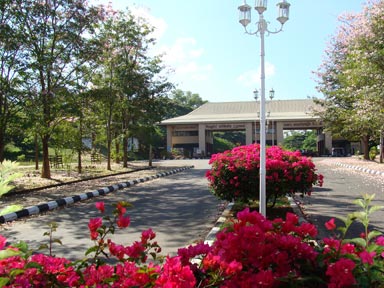BOI embarks on greening project
by Lalin Fernandopulle
The Board of Investment of Sri Lanka (BOI) has embarked on a
going-green project in its zones across the country following the
precedent set by many apparel and Information Technology firms which
have gone green in its manufacturing process.
Green manufacturing is not only vital for retaining customers and
promoting exports but also ensuring sustainable development. The BOI has
launched a forestry cultivation program in Export Processing Zones (EPZ)
to control the adverse impact of industrialisation and promote
sustainable development.
 Today, there are innovative and exciting projects organised around
the idea of planting large numbers of trees. These are understood as
efforts to improve the quality of life, produce more wildlife habitat
and increase ecological resilience and construct green infrastructure,
and are undertaken by various stakeholders. Today, there are innovative and exciting projects organised around
the idea of planting large numbers of trees. These are understood as
efforts to improve the quality of life, produce more wildlife habitat
and increase ecological resilience and construct green infrastructure,
and are undertaken by various stakeholders.
BOI sources said EPZs have a daily influx of thousands of workers and
added that a planned landscape will provide a relaxing effect on the
workers. Director Media and Publicity, BOI, Dilip Samarasinghe said the
BOI is committed to create environment-friendly zones throughout the
country. A massive and comprehensive tree planting exercise is to take
place and will be the first step in that direction.
"Our organisation's longstanding goal is to develop the country but
not at the expense of the environment. We are also aware that today's
consumers want to know the conditions under which the goods they
purchase are produced overseas. A clean environment will be an important
selling point in tomorrow's globalised economy," he said.
Urban forestry will be introduced in the EPZs as multiple use
landscapes to enhance the visual character, create recreational areas,
provide shade, reduce the energy budget of urban buildings such as cost
of air-conditioning, reduction of dust, air pollution and noise level.
The land used to set up EPZs were mostly scrub-land, secondary
forest, plantations with vegetation which shows a considerable extent of
vegetation cover has been removed for EPZs.
Rapid industrialisation has increased emission of greenhouse gases
through transportation, land clearing, and manufacturing resulting in
expansion of the carbon footprint in the country, sources said.
Today there are a number of innovative and exciting projects
organised around the idea of planting trees to improve quality of life,
produce more wildlife habitat and increase ecological resilience, and
construct green infrastructure and are undertaken by stakeholders of
business establishments.
"Many common areas of the EPZ apart from those to be leased out to
investors will be used for planting. Road reservations, footpaths,
reservations around water bodies such as lakes, streams and maturation
ponds, parking areas, bus terminals, land around common facilities such
as administration buildings, health centres, land areas around water and
sewage treatment plants, buffer zones and playgrounds will be used for
planting which will provide favourable working and living conditions for
factory employees and the environment in the region," sources said.
He said the potential for urban forestry within the zones may vary
and as a result constraints have to be taken into account when planning.
Providing land and facilities for investment in commercial forestry
will help minimise damage to forest reserves without affecting the
demand for timber and related products. Private sector support will be
obtained for planting, harvesting, processing and sale of wood products.
"The Board will explore the possibility of launching 'social
forestry' to conserve the forest cover in areas adjacent to EPZs in
rural areas with the support of the local community and investors. Trees
could be planted in the premises of government, semi-government, private
and non-governmental organisations, community lands, cremation grounds,
banks of river, lakes and ponds, private and degraded farmlands and
roadsides, grasslands to improve tree cover and energy plantation," he
said.
Planting stock will be obtained from the Forest Department, Govijana
Seva Centres and private growers. Sources said funding for the project
will be sought from the International Union for Conservation of Nature (IUCN),
Asian Development Bank (ADB) or other agencies funding environmental
conservation.
The green manufacturing process is being adopted by corporates across
the globe to minimise the impact of the production process on the
environment.
Many Sri Lankan firms have adopted green business practices conveying
a strong message to non-adheres of environmental sustainable practices
to join the cause and support efforts to reduce pollution and save the
planet.
Experts said observing green manufacturing practices is indispensable
and has become an integral part of corporate practices to retain
customers who today are increasing concerned of purchasing products that
are produced under environment and labour-friendly conditions.
Green production comprises recycling, use of energy efficient
equipment, proper use of resources such as turning the lights off when
not necessary and proper waste disposal. Ethical manufacturing is
mandatory for importing countries.
Sri Lanka is known for ethical manufacturing that has no sweatshops
and use of child labour.
The 'Garments without Guilt' initiative has paid dividends to the
apparel export sector. Sri Lanka is also known as one of the world's
least polluting countries with a low per capita carbon footprint
compared to developed countries. Studies reveal that around 95 percent
of the organisations are engaged in green initiatives and over 90
percent adopt decent work practices for employees.
|

